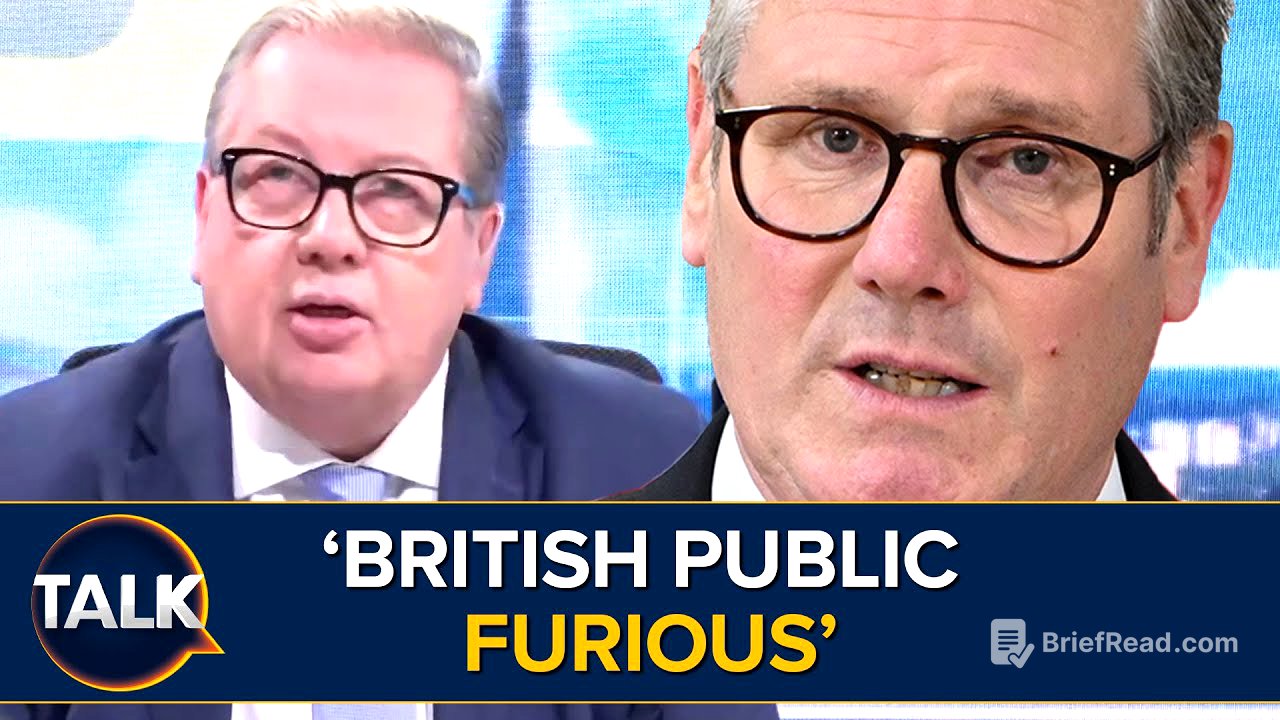TLDR;
The discussion revolves around concerns regarding the increasing number of foreign nationals claiming universal credit in the UK, the fairness of the welfare system, and the recent revelation of a large influx of Afghan refugees. Key points include:
- A significant number of foreign nationals are claiming universal credit, costing billions of pounds annually.
- The current welfare system may disincentivize work and is perceived as unfair to British taxpayers.
- The government's handling of the Afghan refugee situation, including the use of a super injunction to conceal information, has eroded public trust.
- There is a call for a general election to allow the public to decide on the direction of the country.
Universal Credit Claims by Foreign Nationals [0:00]
Katie Lamb discusses her article highlighting that over 100,000 more foreign nationals are claiming Universal Credit since the Labour government took office, bringing the total to 1.3 million. She argues that the system allows migrants to claim benefits after obtaining indefinite leave to remain, even if they are not contributing to the system. Lamb emphasizes that one in six Universal Credit claimants are not British, which is unsustainable and unaffordable. She suggests that individuals who come to the UK with the intention of working but later stop or face hardship should return to their home countries.
Systemic Issues and Disincentives to Work [2:42]
The discussion shifts to the flaws within the welfare system, particularly how it can disincentivize work. The system, including tax credits, effectively subsidizes low wages, which is seen as a flawed approach. It's argued that the focus should be on raising wages or reducing taxes to encourage self-reliance rather than dependence on state benefits. Only 40% of the 1.3 million foreign nationals on Universal Credit are employed, meaning a significant number are claiming benefits without contributing. This costs approximately £6 billion annually, equivalent to the prison system's budget or the cost of training 60,000 new NHS nurses.
Afghan Refugee Situation and Government Transparency [5:23]
The conversation addresses the influx of Afghan refugees and the implications for the UK. Under the current system, these refugees are entitled to support, including housing and benefits, potentially disincentivizing them from seeking employment. The handling of the situation by the Tory government, including the use of a super injunction to prevent public knowledge, is criticized for eroding public trust. The speaker suggests that the government's actions were "useless" and that key figures were aware of the situation but chose to keep it from the public.
Call for a General Election and Public Control [7:56]
The speaker asserts that the current government is ineffective and that the public has been misled. The concealment of the Afghan refugee situation, involving unmarked planes and secret arrivals, is seen as a betrayal of public trust. The speaker calls for a general election to allow the public to regain control over the country's direction. They express a lack of confidence in both major parties and advocate for the public to decide, even if it means choosing a different path.
Eyewitness Account of Afghan Families Resettlement [10:01]
A caller named Amy shares her experience living on an ex-military base in Axbridge, where Afghan families have been resettled since February 2024. She notes that the presence of these families was not a secret within the community. Amy expresses concern that the children of these families, who do not speak English, are not receiving adequate support in schools, creating challenges for both the students and teachers. She also mentions that additional vacant houses on the MOD side of the base are awaiting further developments, but the MOD has not provided clear answers regarding their use. This account corroborates the timeline of the Afghan resettlement scheme, with unmarked planes landing in the UK around March 2024.









